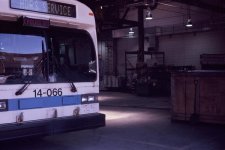mhv
Registered User
One day I made an experiment: I took a roll of ISO 200 slide film in my Kiev 4, and walked around town taking pictures. I did not take a meter reading, I just started with 1/250 and f/11 (appropriate for a sunny day at my latitude). Well blow me, but I managed to expose this scene decently:

It was an ah-ha moment: insofar as I have a starting point, I could make educated guesses at exposure.
In other words, I don't rely on my eyes to guess exposure, but rather I rely on logic: is it sunny or cloudy? do I want shadow details or highlight details? is that shaft of sunlight in the garage diffused by something or not? do I care if spots of light are blown out? is the light falling on the subject artificial or natural? Etc.
I use a meter most of the time, especially when I shoot slides, or when I do night photography. But I realized that in daylight, once you know how to expose your subject in the sunlight and in the shadows, you can leave the meter in the bag because it won't be useful for a while.
It's an attitude that serves me well when I use my Nikon with TTL meter. Instead of adjusting the aperture for every subject it looks at (dark, pale), I don't touch to anything once I know my light.
So the lesson is: instead of metering all the time, meter intelligently, and you will save time and headaches.
It was an ah-ha moment: insofar as I have a starting point, I could make educated guesses at exposure.
In other words, I don't rely on my eyes to guess exposure, but rather I rely on logic: is it sunny or cloudy? do I want shadow details or highlight details? is that shaft of sunlight in the garage diffused by something or not? do I care if spots of light are blown out? is the light falling on the subject artificial or natural? Etc.
I use a meter most of the time, especially when I shoot slides, or when I do night photography. But I realized that in daylight, once you know how to expose your subject in the sunlight and in the shadows, you can leave the meter in the bag because it won't be useful for a while.
It's an attitude that serves me well when I use my Nikon with TTL meter. Instead of adjusting the aperture for every subject it looks at (dark, pale), I don't touch to anything once I know my light.
So the lesson is: instead of metering all the time, meter intelligently, and you will save time and headaches.
Attachments
Last edited:





